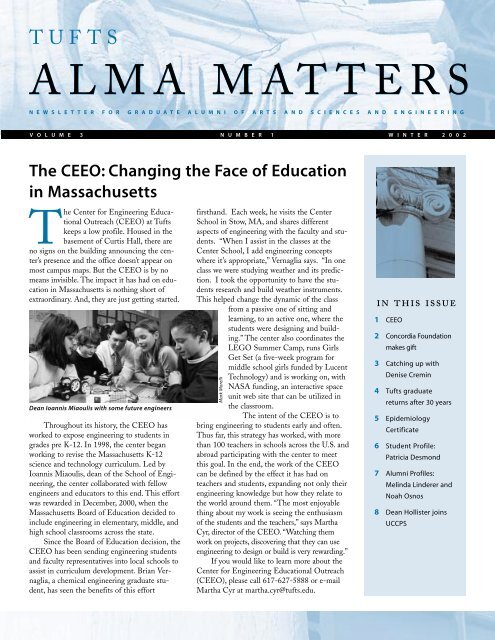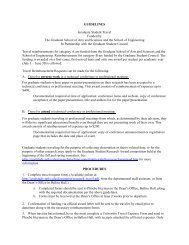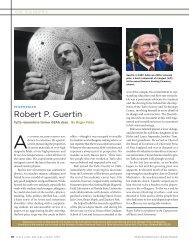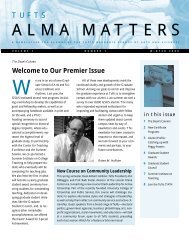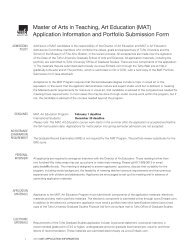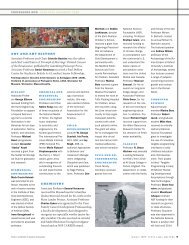alma matters alma matters - Office of Graduate Studies - Tufts ...
alma matters alma matters - Office of Graduate Studies - Tufts ...
alma matters alma matters - Office of Graduate Studies - Tufts ...
Create successful ePaper yourself
Turn your PDF publications into a flip-book with our unique Google optimized e-Paper software.
TUFTS<br />
ALMA MATTERS<br />
N E W S L E T T E R F O R G R A D U A T E A L U M N I O F A R T S A N D S C I E N C E S A N D E N G I N E E R I N G<br />
V O L U M E 3 N U M B E R 1 W I N T E R 2 0 0 2<br />
The CEEO: Changing the Face <strong>of</strong> Education<br />
in Massachusetts<br />
The Center for Engineering Educational<br />
Outreach (CEEO) at <strong>Tufts</strong><br />
keeps a low pr<strong>of</strong>ile. Housed in the<br />
basement <strong>of</strong> Curtis Hall, there are<br />
no signs on the building announcing the center’s<br />
presence and the <strong>of</strong>fice doesn’t appear on<br />
most campus maps. But the CEEO is by no<br />
means invisible. The impact it has had on education<br />
in Massachusetts is nothing short <strong>of</strong><br />
extraordinary. And, they are just getting started.<br />
Dean Ioannis Miaoulis with some future engineers<br />
Throughout its history, the CEEO has<br />
worked to expose engineering to students in<br />
grades pre K-12. In 1998, the center began<br />
working to revise the Massachusetts K-12<br />
science and technology curriculum. Led by<br />
Ioannis Miaoulis, dean <strong>of</strong> the School <strong>of</strong> Engineering,<br />
the center collaborated with fellow<br />
engineers and educators to this end. This effort<br />
was rewarded in December, 2000, when the<br />
Massachusetts Board <strong>of</strong> Education decided to<br />
include engineering in elementary, middle, and<br />
high school classrooms across the state.<br />
Since the Board <strong>of</strong> Education decision, the<br />
CEEO has been sending engineering students<br />
and faculty representatives into local schools to<br />
assist in curriculum development. Brian Vernaglia,<br />
a chemical engineering graduate student,<br />
has seen the benefits <strong>of</strong> this effort<br />
firsthand. Each week, he visits the Center<br />
School in Stow, MA, and shares different<br />
aspects <strong>of</strong> engineering with the faculty and students.<br />
“When I assist in the classes at the<br />
Center School, I add engineering concepts<br />
where it’s appropriate,” Vernaglia says. “In one<br />
class we were studying weather and its prediction.<br />
I took the opportunity to have the students<br />
research and build weather instruments.<br />
This helped change the dynamic <strong>of</strong> the class<br />
from a passive one <strong>of</strong> sitting and<br />
learning, to an active one, where the<br />
students were designing and building.”<br />
The center also coordinates the<br />
LEGO Summer Camp, runs Girls<br />
Get Set (a five-week program for<br />
middle school girls funded by Lucent<br />
Technology) and is working on, with<br />
NASA funding, an interactive space<br />
unit web site that can be utilized in<br />
the classroom.<br />
The intent <strong>of</strong> the CEEO is to<br />
bring engineering to students early and <strong>of</strong>ten.<br />
Thus far, this strategy has worked, with more<br />
than 100 teachers in schools across the U.S. and<br />
abroad participating with the center to meet<br />
this goal. In the end, the work <strong>of</strong> the CEEO<br />
can be defined by the effect it has had on<br />
teachers and students, expanding not only their<br />
engineering knowledge but how they relate to<br />
the world around them. “The most enjoyable<br />
thing about my work is seeing the enthusiasm<br />
<strong>of</strong> the students and the teachers,” says Martha<br />
Cyr, director <strong>of</strong> the CEEO. “Watching them<br />
work on projects, discovering that they can use<br />
engineering to design or build is very rewarding.”<br />
If you would like to learn more about the<br />
Center for Engineering Educational Outreach<br />
(CEEO), please call 617-627-5888 or e-mail<br />
Martha Cyr at martha.cyr@tufts.edu.<br />
Mark Morelli<br />
in this issue<br />
1 CEEO<br />
2 Concordia Foundation<br />
makes gift<br />
3 Catching up with<br />
Denise Cremin<br />
4 <strong>Tufts</strong> graduate<br />
returns after 30 years<br />
5 Epidemiology<br />
Certificate<br />
6 Student Pr<strong>of</strong>ile:<br />
Patricia Desmond<br />
7 Alumni Pr<strong>of</strong>iles:<br />
Melinda Linderer and<br />
Noah Osnos<br />
8 Dean Hollister joins<br />
UCCPS
Mark Morelli<br />
ALMA MATTERS<br />
N E W S L E T T E R F O R G R A D U A T E A L U M N I O F A R T S A N D S C I E N C E S A N D E N G I N E E R I N G<br />
President Bacow with faculty members<br />
President has<br />
high hopes for<br />
graduate studies<br />
The <strong>Graduate</strong> School <strong>of</strong> Arts and<br />
Sciences and the School <strong>of</strong> Engineering<br />
welcomed new president, Lawrence<br />
Bacow, to <strong>Tufts</strong> this past semester.<br />
Before coming to <strong>Tufts</strong>, Bacow served<br />
as MIT’s Chancellor for three years and<br />
was also the Lee and Geraldine Martin<br />
Pr<strong>of</strong>essor <strong>of</strong> Environmental <strong>Studies</strong>.<br />
Bacow has extensive experience with<br />
graduate education and envisions a<br />
promising future for graduate studies<br />
at the university. “<strong>Graduate</strong> education<br />
is very important to <strong>Tufts</strong>,” Bacow says.<br />
“It helps us create new knowledge,<br />
educate the next generation <strong>of</strong> scholars<br />
and practitioners, and strengthens<br />
our scholarly reputation.”<br />
President Bacow hopes to<br />
increase the visibility <strong>of</strong> graduate studies<br />
and feels that alumni can be crucial<br />
contributors to this effort. “Each time<br />
a graduate alumnus does well in his<br />
or her chosen field, they help <strong>Tufts</strong>,”<br />
Bacow says.“Alumni can also help<br />
steer other talented graduate students<br />
to <strong>Tufts</strong> and we hope that they maintain<br />
contact with the university<br />
throughout their lives.”<br />
2 tufts <strong>alma</strong> <strong>matters</strong> winter 2002<br />
Concordia Foundation Makes<br />
Gift to <strong>Tufts</strong> Classics Department<br />
Classics graduate student Joe<br />
DiLuzio spent his summer in a<br />
ditch. And, he couldn’t have been<br />
happier. Thanks to a generous gift from the<br />
Concordia Foundation, DiLuzio participated<br />
in an archaeological dig in June, serving<br />
as a trench master at the Poggio<br />
Civitate site in Murlo, Italy. “With the<br />
support <strong>of</strong> the Concordia Foundation, I<br />
was able to fulfill one <strong>of</strong> my field requirements<br />
while also learning how to excavate,<br />
what to look for on a dig, and how to<br />
record data,” DiLuzio says. “I enjoyed the<br />
experience tremendously.”<br />
Last year, the Concordia Foundation<br />
donated $60,000 to the Classics Department.<br />
The donation helped establish a<br />
permanent endowed fund to aid the work<br />
<strong>of</strong> graduate students like Joe DiLuzio.<br />
On a break at the Poggio Civitate site in Murlo, Italy<br />
Based in Princeton, New Jersey, the<br />
Concordia Foundation supports a wide<br />
range <strong>of</strong> charitable, educational, environmental,<br />
literary, and artistic endeavors. The<br />
foundation’s gift helps graduate students<br />
who participate in summer programs or<br />
digs in Europe and those who attend pr<strong>of</strong>essional<br />
meetings. “This donation serves<br />
many purposes,” says Pr<strong>of</strong>essor Peter Reid,<br />
chair <strong>of</strong> the Classics Department. “Currently,<br />
to attend a dig at the Agora in<br />
Athens or a summer session <strong>of</strong> the<br />
Vergilian Society in Italy, it would cost at<br />
least $3,000, a sum that few graduate<br />
students can afford without assistance. The<br />
Concordia Foundation’s gift will allow<br />
students to take advantage <strong>of</strong> these tremendous<br />
opportunities.”<br />
“With the support<br />
<strong>of</strong> the Concordia<br />
Foundation, I was<br />
able to fulfill one<br />
<strong>of</strong> my field<br />
requirements while<br />
also learning how<br />
to excavate,<br />
what to look for<br />
on a dig, and how<br />
to record data.”<br />
—Joe DiLuzio
Catching Up With Denise Cremin<br />
B.A., 1989; M.A.T., 1990<br />
For Denise Cremin, it’s all about the<br />
moment. She’ll be working with<br />
one <strong>of</strong> her students and then, unexpectedly,<br />
it will hit. Most teachers can<br />
relate to the moment, the instant when a<br />
student comprehends what’s being taught.<br />
It’s like light illuminating a darkened<br />
room. It is the essence <strong>of</strong> teaching. “I love<br />
watching when a student finally understands,<br />
really gets what I’m teaching,”<br />
Cremin says. “There’s nothing more satisfying<br />
as a teacher.”<br />
Cremin, a Spanish teacher at Newton<br />
North High School, has experienced this<br />
satisfaction <strong>of</strong>ten. Her success can be<br />
attributed to many things. She’s dedicated,<br />
patient, and willing to do almost anything<br />
for her students, even if it means taking on<br />
the United States government.<br />
In 1997, Cremin and a colleague<br />
decided to take a group <strong>of</strong> students to<br />
Cuba, figuring it would be a valuable educational<br />
experience for all those involved.<br />
The U.S. Treasury Department thought<br />
differently. “In order to go to Cuba you<br />
need to get a license from the Treasury<br />
Department,” she says. “They refused to<br />
give us one because there were no programs<br />
like ours for high schools. We were not satisfied<br />
with this decision.”<br />
Cremin’s dissatisfaction manifested<br />
itself in letters. Lots <strong>of</strong> them.<br />
Over the ensuing months, Cremin<br />
wrote letters to Cardinal Law, former President<br />
Clinton, and Massachusetts Congressman<br />
Barney Frank, urging them to use<br />
their influence in any way they could.<br />
These efforts proved successful in 1999<br />
when Cremin was issued a license.<br />
But Cremin’s work was far from over.<br />
The Treasury Department was an easy sell<br />
compared to the Cuban government. “In<br />
September <strong>of</strong> 1999, we met with the<br />
Cuban government and their ministry <strong>of</strong><br />
education and told them what we wanted<br />
to do,” Cremin says. “Dealing with a government<br />
and trying to get visas for students<br />
is difficult enough, but when there are tensions<br />
between the two nations it’s even<br />
Denise Cremin is all smiles following another successful trip to Cuba<br />
more so. But then, about two weeks before<br />
we were scheduled to leave, we were given<br />
clearance to come down.”<br />
As expected, the trip to Cuba that April<br />
was an eye-opening experience. The students<br />
came face-to-face with a vastly different<br />
culture and Cremin was well aware<br />
<strong>of</strong> some obstacles that needed to be overcome.<br />
“I had lots <strong>of</strong> experience taking<br />
students abroad before this trip,” she says,<br />
“but traveling to a communist country<br />
where there is very little American travel<br />
was different. We really had to train the<br />
kids to think before they spoke. We<br />
impressed upon them the importance <strong>of</strong><br />
being diplomatic when interacting with<br />
the Cuban people and our students performed<br />
admirably.”<br />
The Cuba program, now in its second<br />
year, involved spending time at a high<br />
school in Santiago, which is on the Eastern<br />
tip <strong>of</strong> Cuba. While there, Cremin’s group<br />
interviewed Cuban students about their<br />
lives and experiences. “We wanted our students<br />
to learn certain things about Cuba,”<br />
Cremin says. “We did a lot <strong>of</strong> exchange<br />
with these students in terms <strong>of</strong> language,<br />
music, and history. Our students went to<br />
classes at the school and they really bonded<br />
with their Cuban counterparts.”<br />
While organizing the trip was an<br />
impressive feat, Cremin has a l<strong>of</strong>tier goal.<br />
She would like to create a literacy program<br />
for Hispanic women in Boston. “I’d like to<br />
create a program where these women could<br />
learn skills that they could put on their<br />
résumés. And hopefully an employer would<br />
see that having a bilingual employee is a<br />
valuable asset. This program is my eventual<br />
goal,” she says.<br />
Until this aspiration becomes a reality,<br />
Cremin will continue to teach. It is, in her<br />
words, a calling. She will follow this calling<br />
as she engages her students in lively classroom<br />
discussions. She will follow it as she<br />
plans future trips with them. But most <strong>of</strong><br />
all, she will follow it as she works with her<br />
students, waiting for the moment to hit.<br />
When it does, she’ll sit back and enjoy<br />
the light.<br />
winter 2002 tufts <strong>alma</strong> <strong>matters</strong> 3
ALMA MATTERS<br />
N E W S L E T T E R F O R G R A D U A T E A L U M N I O F A R T S A N D S C I E N C E S A N D E N G I N E E R I N G<br />
<strong>Tufts</strong> <strong>Graduate</strong> Returns After 30 Years<br />
Family Matters: Michael Samet with son, Nati<br />
The year is 1971 and Michael Samet<br />
is ready to graduate from <strong>Tufts</strong> with<br />
a Ph.D. in Experimental Psychology.<br />
Samet is at the end <strong>of</strong> a long educational<br />
journey, one that will give birth to<br />
many future pr<strong>of</strong>essional achievements, the<br />
most pr<strong>of</strong>ound being the creation <strong>of</strong> the<br />
word-processing program, Einstein (a system<br />
that will revolutionize personal computer<br />
usage in Israel during the late ’80s).<br />
But Einstein is in the future. It is the present<br />
that beckons. All that remains is commencement,<br />
a final step that will close one<br />
chapter <strong>of</strong> Samet’s life while opening up an<br />
entirely new one. But Samet missed his<br />
graduation. Instead <strong>of</strong> being handed his<br />
diploma in the summer <strong>of</strong> ’71, he was in a<br />
Washington, D.C., hospital awaiting a<br />
delivery <strong>of</strong> another kind: his daughter, Efrat.<br />
The years following his daughter’s birth<br />
pass quickly. Samet invents Einstein. He<br />
teaches at the Technion in Israel. His time<br />
at <strong>Tufts</strong> becomes the stuff <strong>of</strong> memories.<br />
His children, seven in all, grow up to be<br />
4 tufts <strong>alma</strong> <strong>matters</strong> winter 2002<br />
like their mother and father: intelligent,<br />
industrious, kind. And before long, they<br />
begin their own advanced studies, continuing<br />
the family tradition <strong>of</strong> scholarship.<br />
Three decades have passed. It’s 2001<br />
now and the Samet children are preparing<br />
to graduate themselves, Ron from Yale<br />
Medical School, Shai from the Cardozo<br />
Law School at Yeshiva University. Samet<br />
sees an opportunity. He decides that the<br />
time is right to be recognized for what he<br />
has achieved. So, he sends the graduate<br />
school an e-mail. “I graduated in 1971 with<br />
a Ph.D.,” the message says. “And I want to<br />
participate in this year’s commencement.”<br />
Plans are made and Samet finds himself<br />
back at <strong>Tufts</strong>, waiting for the commencement<br />
ceremonies to begin. He is wearing a<br />
cap and gown and standing with his son,<br />
Nati, an M.B.A. candidate at John Hopkins.<br />
Samet and his son are surrounded by<br />
members <strong>of</strong> the graduating class. Their<br />
conversations focus on that next phase <strong>of</strong><br />
life, one that Samet knows very well. After<br />
We’d like to hear<br />
from you<br />
If there are comments you would like<br />
to make, issues you would like to see<br />
covered, an article you would like to<br />
contribute, or if there is a fellow<br />
alumnus whom you would like to see<br />
interviewed for future “Catching Up<br />
With” pr<strong>of</strong>iles, please send your<br />
comments and suggestions to:<br />
ALMA MATTERS<br />
Robert Bochnak, editor<br />
<strong>Tufts</strong> University<br />
<strong>Graduate</strong> and Pr<strong>of</strong>essional <strong>Studies</strong><br />
Ballou Hall<br />
Medford, MA 02155<br />
phone: 617-627-5826<br />
web site:<br />
http://ase.tufts.edu/gradstudy<br />
e-mail: robert.bochnak@tufts.edu<br />
all, he’s been there and he’s going strong.<br />
The question begs to be asked, <strong>of</strong><br />
course. Why? Why would someone walk<br />
through graduation thirty years after the<br />
fact? For Samet, it’s a family thing. “I participated<br />
in commencement to identify<br />
with my children, a few <strong>of</strong> whom were<br />
graduating themselves around this time,”<br />
Samet says. “I wanted to show them that, a<br />
generation before them, I too merited the<br />
kind <strong>of</strong> academic accomplishments that<br />
they were achieving.”<br />
Around noon, the Ph.D. candidates<br />
names are called. Upon hearing his,<br />
Michael Samet receives his long-delayed<br />
moment <strong>of</strong> academic pride and joy. The<br />
audience doesn’t know much about Samet.<br />
He appears to be just another doctoral student.<br />
If they knew him, they might understand<br />
what he’s doing or they might not.<br />
Either way it doesn’t really matter because<br />
on May 20, 2001, Dr. Michael G. Samet<br />
came back to <strong>Tufts</strong>. After 30 years, a chapter<br />
closed.
Epidemiology Certificate Promises Something<br />
for Everyone<br />
What do a lawyer and a pharmacist<br />
have in common? At <strong>Tufts</strong>,<br />
more than you might think.<br />
As part <strong>of</strong> its continuing effort to appeal<br />
to pr<strong>of</strong>essionals from a variety <strong>of</strong> fields, the<br />
university has created a graduate certificate<br />
in Epidemiology. Offered by the School <strong>of</strong><br />
Engineering in collaboration with the<br />
School <strong>of</strong> Medicine and the Gerald J. and<br />
Dorothy R. Friedman School <strong>of</strong> Nutrition<br />
Science and Policy, the epidemiology certificate’s<br />
appeal lies in its expansive reach.<br />
“One <strong>of</strong> the strong points <strong>of</strong> this program<br />
is that I could probably name 30-40 disciplines<br />
where people would benefit from<br />
this certificate,” says Mark Woodin,<br />
epidemiology certificate adviser and civil<br />
“Many people have an interest in epidemiology but<br />
don’t feel that they have the background to study it.<br />
The certificate provides an opportunity for people<br />
from all backgrounds to get formal graduate level<br />
training in epidemiology.”—Mark Woodin<br />
and environmental engineering lecturer. “If<br />
you’re a lawyer interested in health law or a<br />
pharmacist who would like to keep up with<br />
the current literature, this certificate could<br />
help you understand and translate epidemiological<br />
information easily.”<br />
Open to individuals with a bachelor’s<br />
degree, the program is also appropriate for<br />
clinicians (physicians, veterinarians, social<br />
workers, and psychologists), environmental<br />
engineers and scientists, human service<br />
pr<strong>of</strong>essionals, biotechnology pr<strong>of</strong>essionals,<br />
and anyone who provides and interprets<br />
epidemiological findings to the public. “I<br />
designed this certificate so a large number<br />
<strong>of</strong> people would be eligible to take it,” says<br />
Woodin. “Many people have an interest in<br />
epidemiology but don’t feel that they have<br />
the background to study it. The certificate<br />
provides an opportunity for people from all<br />
backgrounds to get formal graduate level<br />
training in epidemiology.”<br />
By <strong>of</strong>fering a part-time course <strong>of</strong> study<br />
aimed at working pr<strong>of</strong>essionals, <strong>Tufts</strong> is a<br />
Alma Matters seeks Editorial Board<br />
Mark Woodin, lecturer,<br />
civil and environmental<br />
engineering<br />
trendsetter in the field <strong>of</strong> epidemiology.<br />
“When we decided to create a graduate epidemiology<br />
certificate, there wasn’t<br />
anything like it out there for working<br />
pr<strong>of</strong>essionals in need <strong>of</strong> some basic understanding<br />
<strong>of</strong> this science,” Woodin says.<br />
“What we have created is a logical sequence<br />
<strong>of</strong> courses which will provide enough<br />
knowledge <strong>of</strong> epidemiology that at the conclusion<br />
<strong>of</strong> the program pr<strong>of</strong>essionals will be<br />
able to apply it to their own work.”<br />
If you would like to learn more about<br />
the epidemiology certificate please contact<br />
the <strong>Graduate</strong> and Pr<strong>of</strong>essional <strong>Studies</strong><br />
<strong>of</strong>fice at 617-627-3395, pcs@ase.tufts.edu<br />
or Mark Woodin at 617-627-3640,<br />
mark.woodin@tufts.edu.<br />
Over the past few months, the <strong>Graduate</strong> School <strong>of</strong> Arts and Sciences and the School <strong>of</strong><br />
Engineering have been meeting to discuss Alma Matters and how it can best serve the<br />
interests <strong>of</strong> our alumni. Out <strong>of</strong> these discussions came the unanimous decision to create<br />
an Editorial Board composed <strong>of</strong> our distinguished graduates. Board members will take<br />
an active role in everything from story ideas to the “look” <strong>of</strong> the publication. If you are<br />
interested in this opportunity, please call Robert Bochnak at 617-627-5826 or e-mail<br />
him at robert.bochnak@tufts.edu.<br />
winter 2002 tufts <strong>alma</strong> <strong>matters</strong> 5<br />
Mark Morelli
student pr<strong>of</strong>ile<br />
ALMA MATTERS<br />
N E W S L E T T E R F O R G R A D U A T E A L U M N I O F A R T S A N D S C I E N C E S A N D E N G I N E E R I N G<br />
Patricia Desmond: Unlocking Potential<br />
B.S. 1987, Boston University<br />
Desmond, a computer science graduate student, using a data glove in the Human-<br />
Computer Interaction Lab at Halligan Hall<br />
When Patricia Desmond,<br />
a computer science graduate<br />
student, looks at a<br />
computer she doesn’t see a keyboard, a<br />
monitor, and a collection <strong>of</strong> tangled<br />
wires. She sees a tool that can help<br />
people achieve something greater.<br />
“I believe that human beings are extraordinary<br />
and I think computers can<br />
help them go further intellectually,”<br />
she says. “I look at a computer like I do<br />
a screwdriver. A screwdriver by itself<br />
isn’t that interesting. But if you look at<br />
how someone can use it to build a<br />
house, then your perspective begins to<br />
change. You begin to see it as a tool<br />
that can help you accomplish something<br />
and I find that very interesting.”<br />
Desmond hopes user interface<br />
technology can help unlock the<br />
potential <strong>of</strong> each individual. Aiming<br />
to simplify computer usage, user<br />
interface technology could be anything<br />
from monitors that function<br />
6 tufts <strong>alma</strong> <strong>matters</strong> winter 2002<br />
based on eye movement to voice<br />
recognition s<strong>of</strong>tware. The intent <strong>of</strong><br />
this technology is to liberate individuals<br />
from the mundane and timeconsuming<br />
tasks associated with computers.<br />
Activities like typing and<br />
manipulating a mouse might appear<br />
effortless, but they are functions that<br />
take the user away from more<br />
substantive work, thus decreasing<br />
his or her productivity.<br />
While these innovations may<br />
seem like years in the future, they are<br />
closer than we think. “What we see in<br />
a computer won’t be there ten years<br />
from now,” Desmond says. “The<br />
industry is moving so fast and there<br />
have been many breakthroughs <strong>of</strong><br />
late. For example, it was with the aid<br />
<strong>of</strong> computers, and their ability to<br />
rapidly sequence and analyze DNA,<br />
that we were able to map the human<br />
genome two years ahead <strong>of</strong> schedule.”<br />
Desmond earned a B.S. in 1987<br />
“What we see in a<br />
computer won’t<br />
be there ten years<br />
from now. The<br />
industry is moving<br />
so fast and there<br />
have been many<br />
breakthroughs <strong>of</strong> late.”<br />
—Patricia Desmond<br />
from Boston University. She came to<br />
<strong>Tufts</strong> as a graduate special student in<br />
1998 and entered the master’s<br />
program in computer science that<br />
spring. It was during this time that<br />
Desmond came into contact with several<br />
faculty members she describes as<br />
“scary smart.”<br />
Intellectual role models like<br />
Stephen Morrison, Robert Jacob, and<br />
Anselm Blumer, faculty members in<br />
the Electrical Engineering and Computer<br />
Science (EECS) Department,<br />
have not only supported Desmond’s<br />
academic growth, but they have also<br />
encouraged her to make a lasting contribution<br />
to society. “The faculty <strong>of</strong><br />
EECS truly care about their<br />
students and they want you to grow,”<br />
Desmond says. “They have inspired<br />
me to make a theoretical or practical<br />
contribution back to society. I believe<br />
I can do this by making computers<br />
easier to use.”
Dan Smith<br />
Melinda Linderer M.A., Art History, 1995<br />
Each weekend, Melinda Linderer<br />
leaves her Washington, D.C.,<br />
home and hits the road. Every<br />
trip is different. Sometimes she goes<br />
only a few blocks. Other times, her travels<br />
can be measured in miles. But regardless<br />
<strong>of</strong> the distance covered, what<br />
Linderer discovers on these trips speaks<br />
volumes about who we were hundreds <strong>of</strong><br />
years ago. “When I’m not working, I<br />
enjoy viewing historic exhibitions and<br />
driving out into the countryside to look<br />
at old homes and objects,” Linderer says.<br />
“A silver teapot made by Paul Revere is a<br />
beautiful object that you might admire at<br />
the Museum <strong>of</strong> Fine Arts. But to know<br />
what it took to serve a cup <strong>of</strong> tea in the<br />
eighteenth century, who got up in the<br />
morning to stoke the fire, how the tea<br />
was imported, interests me.”<br />
As Curator <strong>of</strong> Collections at Tudor<br />
Place Historic House and Garden in<br />
Washington, D.C., Linderer is responsible<br />
for the home’s 8,000 objects and<br />
Noah Osnos always finds time to<br />
play. Whenever he has the<br />
chance, he goes into his living<br />
room, takes a seat, and lets loose. He’s<br />
been this way since he was a kid. “I play<br />
music everyday, mostly jazz with some<br />
classical,” Osnos says. “My grandmother<br />
150,000 archival documents. Like<br />
Revere’s teapot, each piece is unique and<br />
serves as a reminder <strong>of</strong> times past. “My<br />
main role at Tudor Place is to oversee the<br />
organization, storage, documentation,<br />
and management <strong>of</strong> these items,” she<br />
says. “But it wasn’t just the study <strong>of</strong> art<br />
history that drew me to museum work.<br />
I’m involved in this kind <strong>of</strong> work because<br />
I get to interact so closely with historic<br />
objects. It’s amazing to see the paint<br />
strokes and the unbelievable craftsmanship<br />
that went into something like a<br />
dovetail or a carved ornament <strong>of</strong> a 200<br />
year-old piece <strong>of</strong> furniture.”<br />
Managing a collection like Tudor<br />
Place is a daunting task, made more so<br />
by elements which are <strong>of</strong>ten beyond the<br />
control <strong>of</strong> the curator. Everything from<br />
water infiltration to structural problems<br />
that come with a 200 year-old house can<br />
cause damage to the pieces. Pests like<br />
rats, bats, and birds can also wreak havoc<br />
and, because <strong>of</strong> this, proper monitoring<br />
Noah Osnos B.A., Music, 1980; M.A., Economics, 1984<br />
was an accomplished classical pianist<br />
and I have her Steinway B from 1923 in<br />
my home. She taught me to play the<br />
piano when I was in second grade and<br />
I’ve been interested in music ever since.”<br />
Since that childhood experience,<br />
Osnos has gone on a musical voyage few<br />
can rival. Along with playing a wide range<br />
<strong>of</strong> instruments, from the piano to the<br />
flute, he was general manager <strong>of</strong> the <strong>Tufts</strong><br />
WMFO station, spent time at CBS<br />
records, and currently works as director <strong>of</strong><br />
royalties at Tommy Boy Music.<br />
Rebuilding the royalty system database<br />
at Tommy Boy is one <strong>of</strong> his latest<br />
projects. “When I first arrived here six<br />
years ago we were using an antiquated<br />
DOS-based system,” Osnos says. “Since<br />
The Music Man: Osnos at Tommy Boy Music<br />
procedures are <strong>of</strong> the utmost importance.<br />
But even in the face <strong>of</strong> these<br />
obstacles, Linderer remains undeterred.<br />
“My goal at Tudor Place is to preserve<br />
and interpret the collection for present<br />
and future generations,” she says. “There<br />
is no use in preserving our wonderful<br />
national treasures and stories unless we<br />
have someone to share them with.”<br />
Linderer in front <strong>of</strong> Tudor Place<br />
then, I have rewritten and upgraded the<br />
system to make it more flexible when<br />
dealing with the intricacies <strong>of</strong> royalties in<br />
the record business.”<br />
For Osnos, who received a master’s<br />
degree in Economics in 1984, his position<br />
at Tommy Boy lets him use several<br />
skills that he’s accumulated over the<br />
years. “The best part <strong>of</strong> my job is that<br />
I get to combine my programming<br />
skills and financial background with a<br />
long-term love and knowledge <strong>of</strong><br />
music,” he says.<br />
A lot has changed since Osnos was a<br />
young boy learning the piano. He has<br />
earned an advanced degree, gotten married,<br />
and been a vital contributor to several<br />
companies. But his love for music<br />
remains constant and he’ll always find<br />
time to play.<br />
Some things, after all, never change.<br />
winter 2002 tufts <strong>alma</strong> <strong>matters</strong> 7<br />
alumni pr<strong>of</strong>iles<br />
Judith Pratt
ALMA MATTERS<br />
N E W S L E T T E R F O R G R A D U A T E A L U M N I O F A R T S A N D S C I E N C E S A N D E N G I N E E R I N G<br />
Dean Hollister joins UCCPS<br />
ROB HOLLISTER STEPPED DOWN AS<br />
dean <strong>of</strong> the <strong>Graduate</strong> School <strong>of</strong> Arts and Sciences<br />
in June 2001. Hollister became dean in<br />
1996 and during his tenure made some vital,<br />
long lasting contributions to graduate education<br />
at <strong>Tufts</strong>. Along with bolstering the reputation<br />
<strong>of</strong> A&S and advocating for the <strong>Graduate</strong><br />
Student Council (GSC), he also spearheaded an<br />
effort to review graduate school programs on a<br />
regular basis and created several student recognition<br />
events. “I enjoyed my time at the graduate<br />
school tremendously,” says Hollister.“I think<br />
we helped develop a stronger shared vision for<br />
A&S and I’m proud <strong>of</strong> the events we initiated for<br />
graduate students, particularly the annual graduate<br />
student awards program and the Ph.D.<br />
Hooding Ceremony.” The graduate school<br />
would like to thank Dean Hollister for his work<br />
and wish him all the best in his new role as dean<br />
<strong>of</strong> the <strong>Tufts</strong> University College <strong>of</strong> Citizenship<br />
and Public Service (UCCPS).<br />
Susan Ernst has taken over as dean <strong>of</strong> the<br />
School <strong>of</strong> Arts and Sciences. Dean Ernst, who<br />
holds bachelor’s and doctorate degrees in zoology,<br />
joined <strong>Tufts</strong> in 1979 as an assistant pr<strong>of</strong>es-<br />
ALMA MATTERS<br />
<strong>Graduate</strong> and Pr<strong>of</strong>essional <strong>Studies</strong><br />
Ballou Hall<br />
Medford, Massachusetts 02155<br />
Produced by the <strong>Tufts</strong> University <strong>Office</strong> <strong>of</strong> Publications<br />
sor in the Biology Department. She was the<br />
chair <strong>of</strong> that department for seven years and<br />
has most recently served as dean <strong>of</strong> natural and<br />
social sciences. As dean <strong>of</strong> the School <strong>of</strong> Arts<br />
and Sciences, she will be responsible for both<br />
graduate and undergraduate education and will<br />
serve on the President’s Council with Ioannis<br />
Miaoulis, dean <strong>of</strong> the School <strong>of</strong> Engineering, and<br />
the deans <strong>of</strong> the other schools.<br />
A pr<strong>of</strong>essor <strong>of</strong> Biology, Dean Ernst has been<br />
involved with graduate education at <strong>Tufts</strong> for<br />
several years, describing the experience as “an<br />
important and rewarding part <strong>of</strong> my career at<br />
the university.” She has served as a thesis<br />
adviser for several Ph.D. and M.S. students and<br />
has recently named Robin Kanarek, pr<strong>of</strong>essor <strong>of</strong><br />
Psychology and the John Wade Pr<strong>of</strong>essor, dean<br />
<strong>of</strong> the <strong>Graduate</strong> School <strong>of</strong> Arts and Sciences.<br />
The next issue <strong>of</strong> Alma Matters will include an<br />
article on her legacy <strong>of</strong> achievement at <strong>Tufts</strong><br />
and the goals she has for the graduate school.<br />
Please join us in welcoming Dean Ernst and<br />
Dean Kanarek to the graduate school. For more<br />
information call 617-627-3395.<br />
EDITOR<br />
ROBERT BOCHNAK<br />
ACTING EDITORIAL<br />
DIRECTOR<br />
STEPHEN MORRISON,<br />
B.S.‘88, M.S. ‘96, PH.D. ‘98<br />
GRAPHIC DESIGN<br />
& PRODUCTION<br />
TUFTS UNIVERSITY<br />
OFFICE OF PUBLICATIONS<br />
3 Please recycle<br />
Nonpr<strong>of</strong>it Org.<br />
U.S. Postage<br />
PAID<br />
Boston, MA<br />
Permit No. 1161


